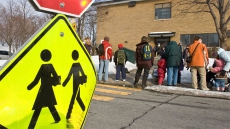TORONTO — "Why didn't you go to police? "
A simple question, but without a simple answer when it is posed to sexual assault victims.
Experts agree that the reasons why sexual assault victims are often reluctant to step forward are myriad.
Mabel Athena is all too aware of the complexity surrounding the issue.
She says a man she'd known for just a few hours raped her twice while she was touring a foreign country. She was in shock and faulted herself for trusting her attacker. She didn't go to police.
Five years later, Athena feels it's important to speak out on the issue.
"For the longest time I blamed myself for putting myself in that situation," she said. "But not dealing with it and having bits and pieces come out and hijack the rest of my life for years — I don't know if it would have been different if I just had the resources right away and been able to confront it right away."
Crisis workers, lawyers and police agree there are many reasons a victim may not come forward — ranging from emotional trauma and fear of authority, to a lack of clarity over just what constitutes sexual assault.
Even for those who do come forward, taking action against an alleged assailant is not easy.
Elizabeth knows that only all too well.
The now 25-year-old — who did not want to give her last name — says a man she met at a bar took her to his home, bit her, choked her unconscious three times, threw her against a mirror so hard it broke, and sexually assaulted her four times, all while she tried to scramble away.
She went to police.
After an investigation that lasted over a year, she says police told her they didn't have substantial evidence to press charges.
"I am glad I did it just on a personal level to know that I did the best that I could, but I would never judge someone for not going forward. It's a horrible process. You have to share your story with so many strangers," she said.
The question "Why didn't you go to police" has become part of the public conversation around allegations against former CBC Radio host Jian Ghomeshi, who has been accused of abusive behavior by women who have gone to newspapers and broadcasters with their allegations and not police. One allegation dates back more than 10 years.
Ghomeshi says he plans to meet allegations against him head-on. He has said he has engaged in role play and rough sex, but that it was always consensual, and said he was fired from CBC because of the risk that his sex life would become public "as a result of a campaign of false allegations." None of Ghomeshi's accusers has so far reported going to police with their allegations.
Speaking generally, Amanda Dale, executive director of the Barbra Schlifer Commemorative Clinic which supports women survivors of violence, says the criminal justice system is set up to protect the rights of the accused.
"It is a large behemoth that you face as one woman alone trying to report what is already a pretty intimate crime, if indeed it meets the threshold of being a crime at all," said Dale. "There are lots of shades of humiliation and degradation and misogyny that don't meet the definition of a crime."
While she noted some positive legal changes in Canada, such as tighter restrictions on the records criminal lawyers can access about an alleged victim, she said avenues outside the legal system can sometimes yield more satisfying results.
"I'm not saying there have been no reforms or that more reforms aren't possible," she said. "I am saying that there are, from the victims perspective, often ameliorative or reparation kinds of schemes actually give more sense of justice than the criminal justice system."
Those other avenues include going to a body like Ontario's Criminal Injuries Compensation Board or similar entities in other provinces which provide financial compensation to victims without the need for a criminal charge if they decide the alleged assaults were a crime.
Victims also have the option of attempting to sue the perpetrator or any institutions involved — a step which isn't right for everyone, but which can be just what some victims need, said Simona Jellinek, a lawyer who has represented victims of sexual assault in civil suits for 18 years.
"What suing does do is it generally helps people come forward and put the blame where the blame needs to be," she said. "Sometimes going through that process is very cathartic and therapeutic in terms of standing up for yourself and taking back control."
What helps many victims is just knowing the options they have available, she said.
Police work hard to emphasize those options as well, and say if women want to report an incident — but not pursue it any further — that's fine with them.
"We recognize how much courage it takes for people to come forward but we also want them to know that we wouldn't force them into doing something that they are not comfortable with," said Sgt. Trish Ferguson of the Sexual Assault and Child Abuse Section of the Ottawa Police Service.
Police also work closely with community agencies and hospitals to encourage reporting of alleged assaults and do outreach work with some of the more vulnerable pockets of the city's population, said Ferguson.
"I think people's reasons for not coming forward are as diverse as the people themselves," she said. "We want to make sure that victims are heard."
It's tough to find hard figures on sexual assaults in Canada though, particularly as the last national survey on violence against women was conducted by the federal government in 1993, said Irene Tsepnopoulos-Elhaimer, of Women Against Violence Against Women, a rape crisis centre in British Columbia.
Her organization conducted their own study, looking at 526 women who accessed their victim services, of which 62 per cent reported their alleged sexual assaults to police, with 11.8 per cent of cases resulting in charges and 4.6 per cent of cases result in a conviction.
"To get a conviction it really, really has to be egregious," said Tsepnopoulos-Elhaimer. "Women will say, how bad was my sexual assault, I wasn't stabbed and left for dead, why should I go forward?"
Compounding the issue is the fact that women may have a relationship of some sort with their assailants.
"We always have this sense that oh, it's a bogeyman in the bushes, and it's like no, no, this is women's everyday experiences being relational humans with men," she said. "How are you going to defend the fact that this was somebody that you know, that's just one strike against you right there."
Another barrier victims face is revictimization, as observers might raise questions about what they were wearing, how much they were drinking and how hard they tried to ward off sexual advances, said Tsepnopoulos-Elhaimer.
Altering those biases will take a societal change as well as support from governments, she said, noting that the Ghomeshi case, while drawing a lot of attention, would likely not trigger significant change.
"If we're waiting for (these women) to make the difference or any woman who shows up at a rape crisis centre or wherever she may be, that is not how we're going to shift society. This is a collective issue."





